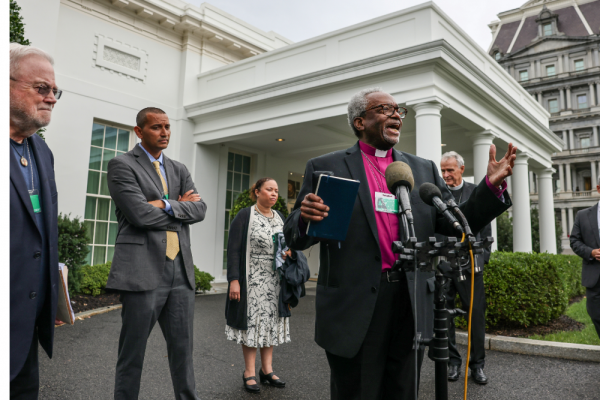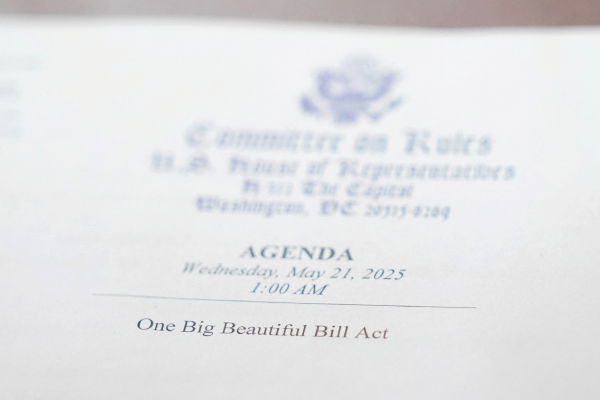This week, members of Congress continued debating what to include in the federal budget, a decision that could have a major impact on our country for the next 10 years. Traditionally, this is a fraught process that involves rounds of negotiations — and often, under-the-wire stopgaps to prevent government shutdowns — to determine what our country prioritizes and how to pay for it. This year, that budget could offer historic support to U.S. families.
Here at Sojourners, we've long argued that budgets — including our federal budgets — are moral documents. As Christians, we see this as a principle deeply rooted in scripture, including Luke's gospel, which explains that the two greatest commandments are to love God and love our neighbors (Luke 10:27). In that same passage, Jesus tells the parable of the Good Samaritan, a story about how our love for God and neighbor will be tested when our neighbors need us the most. Our elected officials are being tested now with an opportunity to help families and communities while also supporting child health and development through all stages of life.
While doing frontline social work with aging adults during the pandemic, I saw the importance of supporting people throughout their lives. The social work code of ethics calls us to meet people where they are, honoring the dignity of life by using our relationships to heal and uplift. This often requires us to connect people with life-saving resources to meet basic needs, including housing, medical care, education, and even transportation. Even amid so much death, I shared moments of joy when I could connect with my patients, who knew I was there to help, sans judgement, and that I genuinely wanted them to live the life God intended for them.
It is not lost on me that many patients would not have survived without access to social supports like housing, food assistance, and access to affordable health care. I also know millions of people of all ages in the United States rely on similar supports. For example, we already know that increasing access to programs such as the Supplemental Nutrition Assistance Program (SNAP) and the recently expanded Child Tax Credit (CTC) demonstrably reduce the risk of poverty and its impacts on health and well-being. These commonsense supports provide the vital resources necessary for families to care for their children. In fact, there is evidence that permanent expansion of the CTC could reduce the number of children living in poverty by over 40 percent. This is akin to Social Security for our children. Congress must make the full tax credit value available to the poorest and most vulnerable households by ensuring its full refundability and expansion. Why wouldn't people of faith fight to ensure supports such as these are included in the budget?
Many people in the United States were already suffering before the pandemic; COVID-19 has exacerbated that hardship for millions of us. As a person of faith, I find this suffering unacceptable, as it dishonors the inherent dignity of people shaped in the image of God. The historic nature of this moment poses a direct challenge to Congress: If not now, when? When will be the right time for elected officials to address the crushing needs of families and communities? Nearly one in seven children — more than 10 million children, or about half the population of New York — are living in poverty. These numbers are even more startling for children of color. According to the Children’s Defense Fund, children in poverty are disproportionately Black, Hispanic, and American Indian/Alaska Native.
Can our elected officials really justify making these children wait for the “right time” to enable them to lift themselves out of poverty? Especially when we know how harmful poverty is on childhood development and their success into adulthood?
Research shows that children thrive when their parents have necessary resources, such as a livable wage, stable housing, access to healthy and affordable foods, and high-quality, comprehensive health care, including mental and behavioral health. Supporting parents is especially critical during the first three years of their child’s life, when developmental changes are occurring that can sabotage a child’s physical, social, and cognitive development into adulthood.
If Congress does not make these vital investments now, millions of children will continue to live in or near poverty, putting them at risk for adverse outcomes into adulthood. This budget reconciliation package must boldly examine where their values lead them to invest in children, their future, and our society.
Sojourners, in partnership with a diverse coalition of Christian leaders, has been pushing our elected officials to seize this moment and fund social programs that will restore dignity to millions who have already suffered so much.
Congress has a historic opportunity be a good Samaritan to the people of our nation at a scale that could cut child poverty in half; promote stable, affordable housing for all families; invest in the care and development of all our children; make meaningful progress against the existential crisis of climate change; creating an immigration system that recognizes the inherent dignity and worth of humanity; and pay for these investments by making sure everyone pays their fair share. Will our elected officials continue to leave us with their thoughts and prayers, or will they act on their professed faith and pass a bold and robust recovery package that invests in individuals, families, and communities in need?
Got something to say about what you're reading? We value your feedback!







